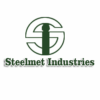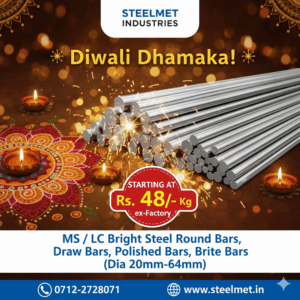Introduction
When selecting steel products for your project, understanding the difference between rolled and forged steel is crucial. Each manufacturing method creates distinct material properties that affect strength, durability, and application suitability.
Steelmet Industries supplies both rolled and forged steel products in various grades and custom dimensions to meet your specific requirements.
Key Differences at a Glance
| Aspect | Rolled Steel | Forged Steel |
|---|---|---|
| Process | Heated and passed through rollers | Heated and shaped under compressive force |
| Grain Structure | Elongated grain flow | Refined, directional grain flow |
| Strength | Good strength | Superior strength and toughness |
| Surface Finish | Smooth | May require machining |
| Cost | Generally more economical | Typically more expensive |
| Production Speed | Faster | Slower |
| Common Forms | Plates, sheets, structural sections | Custom shapes, heavy components |
Detailed Comparison
1. Manufacturing Process
Rolled Steel:
Heated above recrystallization temperature
Passed through successive rollers to achieve desired thickness
Can be hot-rolled (higher temp) or cold-rolled (room temp)
Forged Steel:
Heated to plastic deformation temperature
Shaped using compressive forces (hammers or presses)
Can be open-die or closed-die forging
2. Mechanical Properties
✅ Rolled Steel Advantages:
Consistent dimensions
Good surface finish
Cost-effective for large volumes
✅ Forged Steel Advantages:
25-30% stronger than equivalent cast or rolled parts
Better fatigue resistance
Superior impact strength
3. Common Applications
Rolled Steel Products:
Structural beams and columns
Automotive body panels
Pipes and tubes
Sheet metal applications
Forged Steel Products:
High-stress automotive components (crankshafts, axles)
Heavy machinery parts
Oil and gas equipment
Aerospace components
Which Should You Choose?
For cost-sensitive, high-volume applications → Rolled Steel
For critical, high-strength components → Forged Steel
When directional strength matters → Forged Steel
Steelmet Industries offers both options in:
🔹 Various steel grades (carbon, alloy, stainless)
🔹 Custom sizes and dimensions
🔹 Heat-treated and finished products
📞 Contact our experts to discuss which steel forming method best suits your project.
Conclusion
While rolled steel excels in cost-efficiency and consistency, forged steel provides unmatched strength for demanding applications. Understanding these differences ensures optimal material selection for your project.
Steelmet Industries supplies premium quality rolled and forged steel products – from standard stock to custom-engineered solutions. Get in touch today for your steel requirements!


